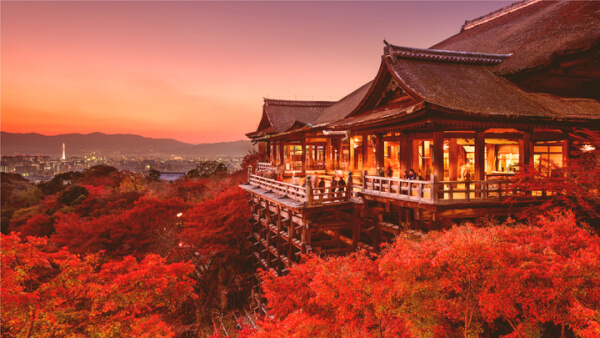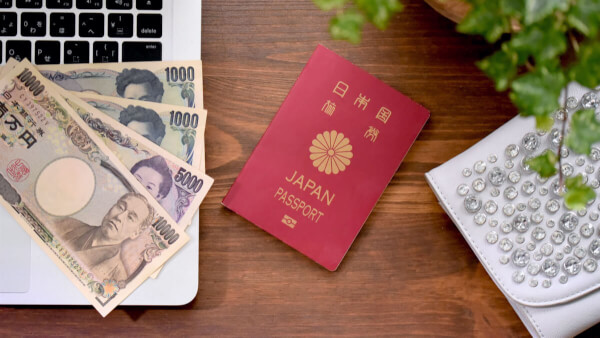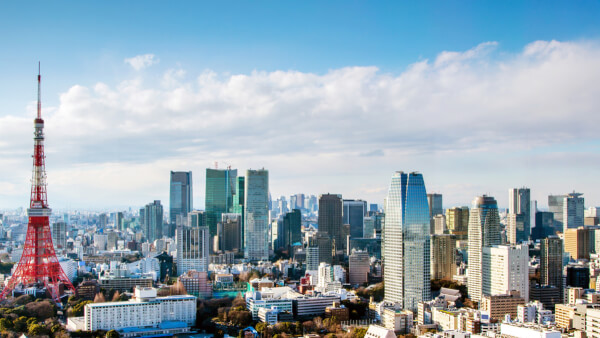How to open a bank account in Japan as a foreigner: US guide
Learn all about opening a bank account in Japan as an American, including costs, requirements, and alternatives.

Americans love Japan. They love the unique culture, cherry blossoms, the never ending nightlife of Tokyo and of course, sushi. Japanese culture fascinates many people in the states, and its strong economy draws in many expats. This article provides some tips and tricks for Americans curious about living in the Land of the Rising Sun.
There’s no country in the world quite like Japan. Japan’s rulers kept the country isolated from the rest of the world for most of its history, and it successfully resisted colonization by a western power. That allowed it to maintain a culture undisturbed by the outside world.
The unique cultural traditions of Japan — such as shinto temples, flower arrangements, minimalist design, and sumo wrestling — are a big draw for many Americans. There’s a lot you can see in Japan and only in Japan. Baseball is also very popular in Japan, so there’s still plenty of cultural overlap with America.
As much as Americans love the food, arts, and sports in Japan, it wouldn’t be worth moving there if they couldn’t find work. Luckily for hopeful expats, Japan has the third largest economy in the world, and as such offers ample economic opportunity.¹ Many American expats find work in Japan teaching English or tutoring in English.
Japan is also a strongly organized society with a reputation for orderliness and cleanliness, even in public areas. Don’t expect to see trash on the street for an extended period of time, or to smell the kind of smells you can get accustomed to in some big cities. It’s even common for some elderly Japanese citizens to clean up the sidewalks in front of their residences after the young folks have partied the night before. There’s a nationwide emphasis to keep things spic-and-span.²
In this interconnected modern world, a lot of countries the world over share many similarities. But life in Japan has some striking differences, both good and bad, from life in the USA.
For one, Japan has a massive, integrated, well-funded, prompt and popular public transit system. Tokyo has one of the largest and most complex subways in the world. Not just that, but Japanese cities are connected by a legendarily well-organized high-speed rail system. These are the famed “bullet trains” you’ve probably heard of, which can top out at 200mph. Japan has around (16,901 miles) 27,200km of railways, around 12,000 miles (19,600km) of which are electrified. The trains also always run on time, a tribute to Japan’s legendary orderliness. If you live in Japan, you most likely won’t have to buy a car, saving you thousands of dollars and plenty of hassle.
Japanese cities, especially Tokyo, are renowned for their nightlife scene. There are countless activities one can get up to after hours. Many bars and nightclubs are open all night, alcohol is sold around the clock, and you can drink on the street. Added to that, Japanese cities like Tokyo are quite compact, which means bars are close together, and close to residential areas. Be prepared to see a lot of partying.
Japanese citizens also have a reputation for courteousness and politeness to strangers and customers. The experience of a pedestrian in Tokyo can differ quite a lot from that of one in New York, where curt behavior is the norm and you have to fight your way through a crowd on the sidewalk. Japanese society places a strong emphasis on social harmony: orderliness, patience, and being considerate to others. This makes for wonderful customer service experiences. Expect to sit in quiet subway cars and have the door opened for you often. Manners are very important.
Japan is also known for being an incredibly safe and law-abiding society. Tokyo is considered one of the safest big cities in the world.³ You can wander around without being worried about running into a bad neighborhood or getting accosted by a gang of teenagers.
The orderliness, safety, predictability, affordability, and pleasantness go a long way, but they come at a price. Since Japanese culture is so stratified and rigid, it can be very difficult for a newcomer, especially a Westerner to build a life and prosper there. While there are many low-level teaching, tutoring, and childcare jobs, it can be hard for expats to rise above the bottom rungs. Being different and outside of the mainstream of society is often viewed quite negatively, and can have a big influence on the kinds of opportunities a person gets.
For more information on the pros and cons of living in Japan, see this article.
Japan has a mixture of universal health coverage and private insurance, often through employers. In the Japanese private healthcare system, individuals are responsible for 30% of the cost of their own healthcare costs, while the Japanese government covers the remaining 70%. The Japanese government requires all Japanese citizens to have health insurance by law.⁴
The World Health Organization ranked Japan’s system the 10th best in the world. The US healthcare system ranked 37th on the same list.⁵ For more information on Japan’s healthcare system, see this helpful article. For information on vaccinations in Japan, you may want to check out this article.

As with many countries, cost of living varies widely based on where one chooses to live. Urban areas are more expensive than rural areas. In Tokyo, Japan’s largest and most expensive city, you can get by for around $1200–$1,800 USD a month, for one person.⁶ Smaller cities and towns will obviously be cheaper.
One drawback, however, is that there a lot of extra costs associated with finding a place to live in Japan. Renters are often obligated to pay first month’s rent, last month’s rent, a realtor fee and a security deposit. You’ll need to let go of a big chunk of change up front.⁷
To give you a better idea of what cost of living looks like, the following table lists the values of some common goods and services in different Japanese locales. Amounts over $10 are rounded to the nearest dollar.⁸
| Tokyo | Osaka | Nara | Sapporo | |
|---|---|---|---|---|
| Meal for 2, mid-range restaurant | $52 | $33 | $36.29 | $36.29 |
| Litre of milk | $1.63 | $1.77 | $1.72 | $1.54 |
| Domestic beer, 0.5 liter bottle | $2.40 | $2.45 | $2.45 | $1.81 |
| Pair of jeans | $58.72 | $68.05 | $61.86 | $79.39 |
| One-bedroom apartment, city center | $1,086.58 | $679.26 | $544.38 | $635.10 |
For a deeper dive on renting an apartment or home in Japan, see this article.
Japan has one of the most modern internet services in the world, and has very high engagement. Japan was one of the earliest countries to use internet, and currently has the fifth-highest number of Internet users in the world, with 117 million.⁹ An Internet connection in Japan is also relatively much cheaper than in the rest of the world. An unlimited Internet service for most homes only costs around $20-40 a year.¹⁰
The cost of using a smartphone is also quite competitive in Japan. Data plans among different providers run from around $15-45 USD.
In many ways, banking works the same in Japan as it does in other countries. One big difference, though, is that you must have a residence card.¹¹ ¹² Beyond that, it’s often just a matter of filling out a form and a minimum deposit is rarely, if ever,required.
But why go through the hassle of opening a bank account in Japan at all? You don’t know how long you’ll be in country, and maybe you’ll want to leave to pursue opportunities elsewhere. Once you decide to be an expat, it’s hard to stay put in one place. A much better option for world travelers is the Wise borderlessaccount. It’s a fully online bank account that provides account holders with bank details for multiple countries. That means you can do you banking in the European Union, the UK, US, and Australia, all from the same account. It also lets you withdraw cash in over 40 currencies (including yen) at the fairest rate: the mid-market exchange rate. Features like the Borderless account are why Wise is up to eight times cheaper than a regular bank.
Japanese society is vibrant, safe, orderly, and welcoming to strangers. Once you take care of a few details, you’ll be able to settle in without too much hassle and begin living an exciting new chapter in your life.
Sources:
All sources last checked 14 May 2019
*Please see terms of use and product availability for your region or visit Wise fees and pricing for the most up to date pricing and fee information.
This publication is provided for general information purposes and does not constitute legal, tax or other professional advice from Wise Payments Limited or its subsidiaries and its affiliates, and it is not intended as a substitute for obtaining advice from a financial advisor or any other professional.
We make no representations, warranties or guarantees, whether expressed or implied, that the content in the publication is accurate, complete or up to date.

Learn all about opening a bank account in Japan as an American, including costs, requirements, and alternatives.

Learn all about buying a car in Japan as an American, including costs, requirements, and how to import your vehicle back to the US.

Moving? Explore our blog for key insights on managing expenses, currency, and more adjustments for a successful move.

Wondering if you're eligible for Japanese citizenship? Find everything you need to know in this handy guide.

Whether you’re an expat already, looking for a second home for family vacations, or want a smart investment, buying real estate in Japan can be a good move....

Japan is a country with a rich history and growing economy. In certain industries, like the tech sector, booms are starting to happen. Japan is quickly...